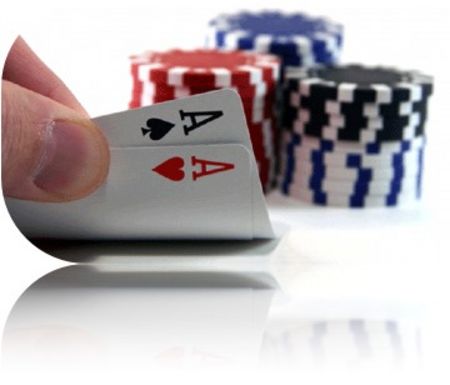Online Tells

A tell is an act or gesture that might give an indication to how strong or weak your
opponent's hand might be. For example, in a live game, you might notice that every
time your opponent throws his chips that he is actually bluffing. There are two types
of tells. General tells indicate the significance of certain actions for most players. An
individual tell is an action specific to a certain player.
Tells are only generalizations. This means that the majority of the time your
opponent will follow the tell, For example, generally most players act strong with
weak hands and act weak with strong hands; however, some players like to use
reverse psychology if they realize you are the type of player who knows that "strong
means weak." General tells serve as a good guideline until you learn more about
each individual opponent. Once you begin to know your opponent, you should be
able to identity that player's individual tells.
In live games, there are many different tells since you can see how your opponent
acts during a hand. Players shake, look away, turn red, scratch their nose, slam
their chips, or even say things that might indicate the strength of their hand. Internet
tells all relate to the speed at which an opponent bets.
Before we discuss each of the online tells, let's look at the two ways you can act on
the internet to bet, raise, check, call, or fold. The most common way is selecting
one of the several buttons that appears on your screen when it is your turn to act.
The other way is to pre-select your action using the "act in turn" buttons. For
example, you can select check/fold or bet/raise before the action ever gets to you.
When you use these "act in turn" buttons, your action will occur almost
instantaneously when it is your turn.
One note of caution when using these types of tells. If you look at the game list and
notice your opponent is playing two tables, a lot of these tells do not work since the
timing of his actions could be thrown off. Let's look now at some of the tells you can
find depending on how fast or slow your opponent acts.
A delay followed by a check often indicates weakness
Most opponents who "think" or wait a longer time than normal and then cheek, are
trying to suggest they have a decent hand. They are trying to indicate strength by
"thinking" about betting, but they really want you to check so that they can get a
free card. If your opponent was going to check-raise, he would generally check at a
normal speed and then raise.
A delay followed by a bet often indicates strength
An opponent who "thinks" a long time and then bets usually has a strong hand. In
this case, he is trying to indicate weakness by "thinking" a long time to lure you into
calling.
An instantaneous bet/raise on the turn or river usually indicates strength
Most players who bet or raise Instantaneously using the "act in turn" buttons on the
turn or river generally have strong hands. Normally strong means weak when
discussing tells, but I generally find that my opponents have strong hands in these
cases. Your opponent thinks that you think he would never raise so fast with a
strong hand: therefore, he uses reverse psychology and raises instantaneously to
make you think that he is weak.
I believe these types of plays are meant to bully you into calling, so he dares you to
call with his instantaneous raise. Don't let this bullying strategy work against you. If
you don't know your opponent, generally an instantaneous action on the turn or
river indicates a very strong hand.
This tell has varying degrees of reliability depending on the street. On the river, an
instantaneous raise almost always means the nuts or a hand close to it. On the
turn, it generally indicates a very strong hand, although some players will
occasionally raise instantaneously with the intention of checking the river. An
instantaneous raise preflop also generally indicates a strong hand, especially from
early to middle position; however, if they are in late position and are raising a late
position player, it is difficult to make generalizations since they might just be
bullying their opponent.
I have found it difficult to generalize about players who bet or raise instantaneously
on the flop. Some players raise with good hands, while others raise with weak
hands trying to buy a free card. This is especially true with preflop raisers who try to
buy a free card with overcards.
An instantaneous check usually indicates weakness
Many players use the check/fold button when they plan on folding their hand to any
bet. This is especially true with players who are playing two tables. There are two
situations where you can use this information to your advantage. Let's say you are
in last position. The first player checks and the next two players instantaneously
check. Since the two middle players probably don't have anything, a bluff might be
successful against the lone opponent who checked early.
Another situation occurs when you are the player who checks early. If your
opponents instantaneously check behind you, you might have a bluffing opportunity
on the next card. These tells work best at the larger sites such as Paradise Poker
and Party Poker where use of this button is common. Many players at these sites
play two games at once and use the check/fold button to quickly move back and
forth between hands.
Two notes of caution related to this tell. Although not very common, be careful
against some tricky players who might use the check/call button to slowplay their
hands. Second, there is a fine line between instantaneous checking and checking
quickly. Use of the auto check/fold button before another player has acted means
that they would have folded their hand if their opponent had bet. This is very
different than someone who checks very quickly once it is his turn to act. This leads
us into our next tell.
A quick check usually indicates weakness,but beware if the player check-raises.
A quick check can indicate weakness also, especially when there are several
players playing the hand; however, if a player checks quickly and then raises, be
very careful! When a player check-raises, the quick check was probably an attempt
to indicate weakness so that you would bet into his strong hand.
Remember that all of these tells are generalizations. They work best against
unknown opponents since you don't have any other information to go by. Once you
have played with a player for a while, observe their betting patterns and then record
what happens when they don't follow their usual pattern. Does his betting pattern
follow the general tell or does he use reverse psychology? Some opponents use
the "act in turn" buttons with both good hands and as bluffs, so an instantaneous
bet from these types of players does not mean anything. Record notes on each player's tendencies
or "tells" for future reference.
As a final note, try not to give tells about your own play to your opponents. There
are two ways to do this. One way is to simply bet at the same speed throughout
every hand. Another way is to randomly change the speed of your betting. For
example, if the last card shown is a red card, you act after two seconds, and if it is a
black card, you act after four seconds. This strategy will confuse your more
observant opponents who are looking for tells and can't find any.
NEXT...High vs. Low Limits

